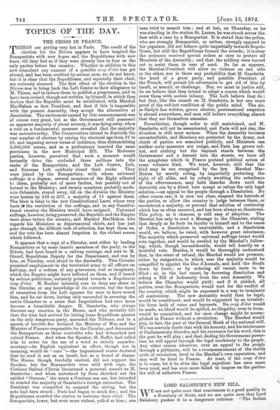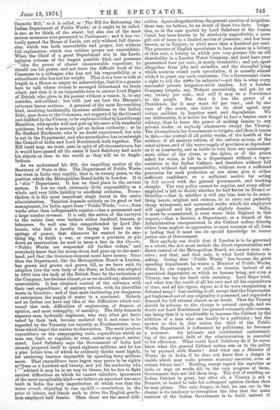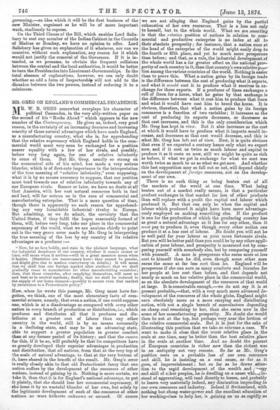LORD SALISBURY'S NEW BILL.
WE are not quite sure that conciseness is a good quality in a Secretary of State, and we are quite sure that Lord Salisbury pushes it to a dangerous extreme. "The Indian adoption into the very body of the State, as India was adopted whom he can support, or scold, or dismiss, instead of an in 1858 into the body of the British State by the extinction of anarchical department on which no human being, not even a
the Company, has become almost, or as we should say, absolutely Viceroy, can lay his hand with certainty. Lord Mayo tried, unavoidable. It has obtained control of the railways, with and what was the result of all his care and all his expenditure their vast expenditure ; of sanitary reform, with its incredible of time, and all his rigour, rigour as if he were reorganising a waste in blunders ; and of that most fascinating yet dangerous defeated army ? Just nothing at all, except that the Department
of enterprises, the supply of water to a continent. Nobody got frightened out of any originality it possessed, and regarded a not an Indian can have any idea of the difficulties which stir- demand for full returns almost as an insult. That the Viceroy round this task, difficulties of engineering, of finance, of should be adverse to the change is natural enough, and we
opinion, and most unhappily, of morality. The duty demands doubt not Lord Northbrook has pressed extremely able reasons, separate men, hydraulic engineers, who very often get fasci- one being that it is unadvisable to increase the Cabinet by the nated by their task, become enslaved by it, and come to be addition of a man who can hardly be a politician ; but the regarded by the Treasury not unjustly as Frankensteins, crea- answer to this is, that unless the chief of the Public tions which impel the creator to destruction. The work involves Works Department is influenced by politicians, he becomes expenditure on the campaigning scale, expenditure which no a nuisance. An intimate and confidential understand- man can limit or regulate, or even, unless an expert, under- ing of the general drift of the administration is essential stand. Lord Salisbury says the Government of India had to his efficiency. What could Lord Salisbury do if he never already prepared itself to spend eighteen millions, and he has knew what the general Cabinet notion was as to the policy
a plan before him, of which he evidently thinks most highly, to be pursued with Russia ? And what can a Minister of for rendering famines impossible by spending forty millions Works do in India, if he does not know that a danger is more. That expenditure once begun may prove to be eighty visible which may make present economy essential, even at niil.ons or a hundred and twenty, and yet the authority who certain future loss ? Nothing, except regard his superiors as 1' Advised it may be in no way to blame, for he has to fight fools, or urge on works till, by the very progress of them,
natural difficulties on which he cannot calculate, ignorances Government dare not bid them stop. The evil of swelling an of the most inexplicable kind—we believe an aqueduct was once Indian Cabinet is great, but after all, a Viceroy is not a built in India the only imperfection of which was that the Premier, or bound to take his colleagues' opinion further than
water struck, objecting to run up-hill — revolutions in the he may please. The only danger, in fact, we can see in the price of labour, and frauds such as drive the English gentle- change is its tendency to strengthen the idea that the main men employed half frantic. Then there are the moral diffi- business of the Indian Government is to build instead of
Councils Bill," as it is called, or The Bill for Reforming the culties. Apart altogether from the general question of irrigation, Indian Department of Public Works,' as it ought to be called, there can, we believe, be no doubt of these two facts. Irriga- is one, as we think, of the wisest, but also one of the most tion, as in the case quoted by Lord Salisbury of the Jumna serious measures ever presented to Parliament ; and it has vir- Canal, has been known to be absolutely unprofitable, a mere tually passed the House of Lords, not only without full discus- gift out of taxes to a limited section of peasants ; and has been sion, which was both unavoidable and proper, but without known, as in Tanjore, to yield more than a hundred per cent. full explanation, which was neither proper nor unavoidable. The pressure of English speculators to have shares in a lottery When the Chief of a great Department sits in the Lords, of that sort, a lottery in which you may prosper like an old igitiates reforms of the largest possible kind, and possesses shareholder in a London Water Company, and must have your
`ides the power of almost unanswerable exposition, he guaranteed four per cent., is nearly irresistible ; and yet, apart should use his power, and not leave the difficult work of the altogether from jobs and swindles, and the shameful lying Commons to a colleague who has not his responsibility, or a which accretes round such speculation, it is morally almost subordinate who has not his weight. That it is a bore to talk at wicked to grant any such concession. Can a Government claim length to a House so empty we acknowledge, that it is a greater a right to sell the airoto its subjects ?—yet this is what every bore to talk where victory is arranged beforehand we freely successful private irrigation-work implies. Let a London admit, and that it is an impossible bore to answer Lord Napier Company irrigate, say, Tirhoot successfully, and get, let us of Ettrick, who gives in his protest without a reason, is, to any say, twenty per cent., and still it may be a Providence outsider, self-evident ; but still, just see how the Marquis's to the people. But then it has the power of a reticence leaves matters. A proposal of the most far-reaching Providence, for it may want 40 per cent., and by one kind, involving incidentally immense additions to the Indian turn of the screw, one letter to its chief agent, may Debt, goes down to the Commons, not supported by the Council reduce millions to hopeless want and degradation. We and disliked by the Viceroy, to be explainedeither by Lord George say deliberately, it is better for Bengal to face a famine once a Hamilton, who speaks well and gets up his cases with wonderful century, than to leave the power of making famine to any quickness, but who is scarcely yet an Indian authority ; or by private trader, or anybody whatsoever except the Viceroy. Sir Stafford Northcote, who is no doubt experienced, but who The alternative is for Government to irrigate, and then it comes is not in the Department, and who nevertheless has to outweigh to this,—the control of all public works, of the health of the the Council of India and Lord Northbrook both together. The soldiery, of all sanitary reform, of the railway system, of the Bill itself may, we trust, pass, in spite of all circumstances, but canal system, and of the'water supply of provinces as dependent it would have passed all the easier if Lord Salisbury had made on it as Lombardy, and as liable to ruin from any mismanage- his objects as clear to the world as they will be to Anglo- ment either of the rivers, or the dykes, or of the prices Indians. asked for water, is left to a Department without a repre- As we understand his Bill, the impelling motive of the sentative in the Indian Cabinet, and therefore without full Secretary of State is this. The Department of Public Works control, without full responsibility, without even a sufficient has risen in India very rapidly, that is, in twenty years, to the guarantee for such protection as can alone give it either position which the Metropolitan Board holds in London. It is sufficient confidence, or a sufficient motive for acting a "side" Department. It has no fixed place in the ancient in full accord with the general government, and working system. It has no rank, extremely little responsibility as a cheaply. The very policy cannot be regular, and every officer whole, and very little liability to unofficial criticism. Never- employed is left to decide whether he had better be Brunel or theless, it is the most important single factor in the entire Brindley,—that is, whether it will pay him best to do some- administration. Taxation depends entirely on its good or bad thing heroic, original, and ruinous, or to carry out patiently management, for India, apart from "Public Works,"—i.e., from cheap, widespread, and successful works, which his employers works other than indispensable repairs,—has a permanent and will applaud and his profession slightly despise. India, a large surplus revenue. It is only the action of the surveyor it must be remembered, is even worse than England in this to the estate that ever bothers either landlord, tenants, or respect,—that a Service, a Department, or a branch of the labourers. So well was this comprehended by Lord Dal- Administration unrepresented in the Cabinet suffers directly housie, who had a faculty for laying his hand on the either from neglect, or oppression, or most common of all, from springs of power, that whenever he wanted to do any- a feeling that it must use its special knowledge to coerce thing big, to finish a war, or conquer a province, or put justice out of Government.
down an insurrection, he used to issue a line in the Gazette, How anybody can doubt that if London is to be governed "Public Works are suspended till further orders," and as a whole, the Act must include the direct representation and everybody knew that the storm-drum had gone up to the mast- direct control of the Metropolitan Board, we cannot even con- head, and that the Governor-General must have money. Since ceive ; and that, and that only, is what Lord Salisbury is then the Department, like the Metropolitan Board in London, asking. Seeing that "Public Works" has become the great has grown and grown and grown till, as we have said, its spending department, he wants a Minister of Public Works, governing,—an idea which it will be the first business of the new Minister, cognisant as he will be of more important work, studiously to repress.
On the Third Clause of the Bill, which enables Lord Salis- bury to seat any member of the Indian Cabinet in the Councils of Madras or Bombay, we have no opinion to offer. Lord Salisbury has given no explanation of it whatever, nor can we conceive, without such explanation, any reason for it which would not justify the removal of the. Governors. If it is in- landed, as we presume, to obviate the frequent collisions between the central and the local authorities, it would be better to turn the Presidencies into Lieutenant-Governorships. In the total absence of explanations, however, we can only doubt whether so odd a form of Inspectorship will not add to the disunion between the two powers, instead of reducing it to a minimum.




































 Previous page
Previous page